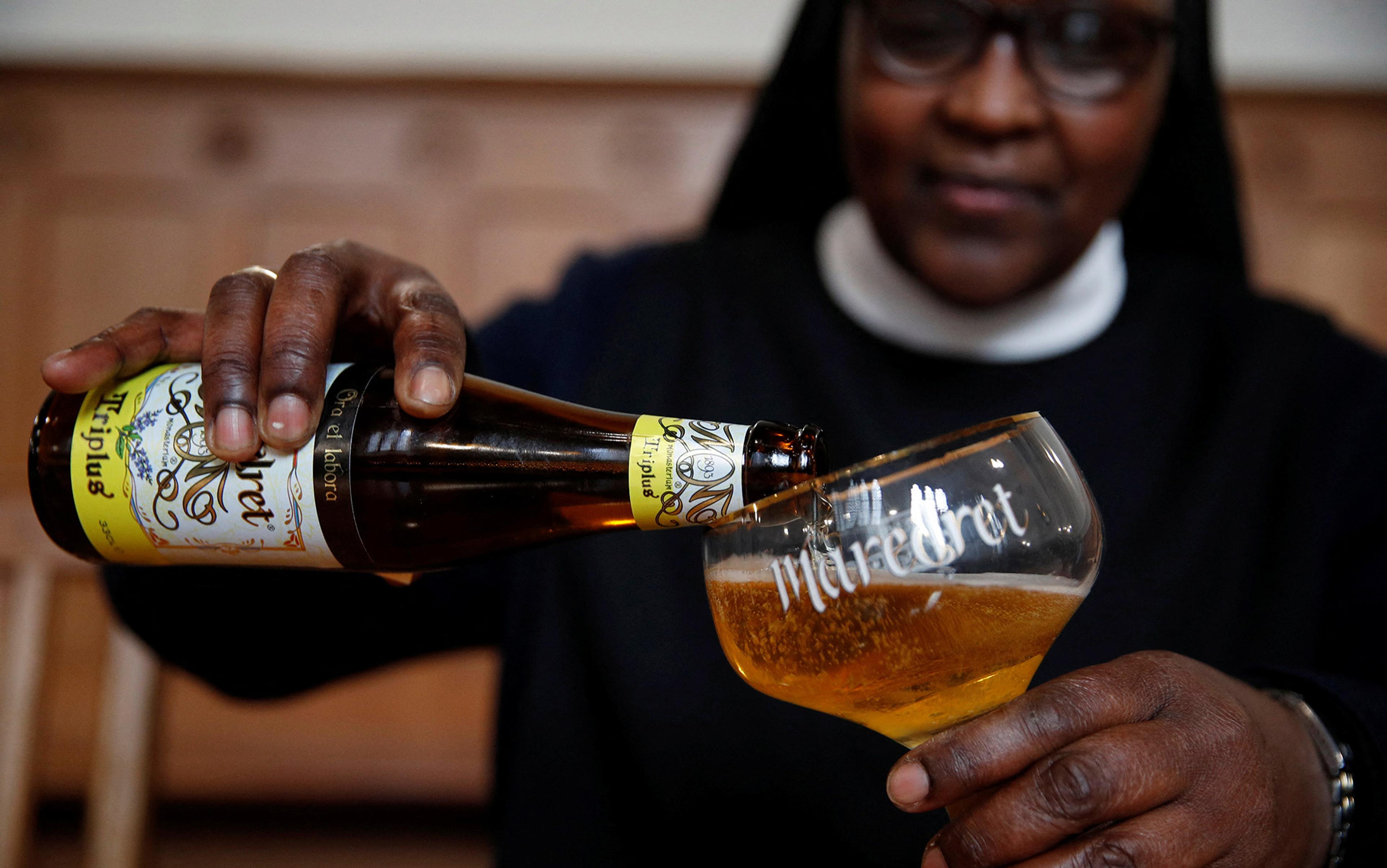It is midday, the sixth hour, sometime between Easter and Pentecost, at a Benedictine monastery, and the monks are gathered for the main meal of the day. It could be any century between the 6th and the 21st, and anywhere from southern Italy to South Korea. Although each monastery is autonomous, governed by its abbot, the order prescribed by the Rule of St Benedict regulates every particular of the proceedings. The monks eat in silence, except for the sound of biblical passages read aloud for their edification. Fare and portions are specified in detail: two cooked meals (no meat), one pound of bread, and a cup of wine daily, no more, no less. Every aspect of life is stipulated: how and when the monks may sleep (all in one room, dressed and belted, with a light burning all night); the order in which the Psalms are to be sung each day (with an added ‘Hallelujah!’ between Easter and Pentecost); clothing (two tunics and two cowls, plus shoes and socks for the monks who work in the fields); bed linens (one mat, sheet, blanket and pillow per monk), when to get up and when to go to bed. If micromanagers have a patron saint, it is surely St Benedict.
Yet each of the 73 chapters that make up the Rule of St Benedict foresees exceptions and mitigating circumstances that may soften the apparently rigid order. The monks may not eat the flesh of four-footed animals – unless the abbot grants permission to the weak and sick who need stronger sustenance. Silence reigns at meals – unless the abbot gives permission to entertain a guest with conversation. Monks are allowed one hemina (around half a pint) of wine and not one drop more – unless they have laboured all day under the hot summer sun. Private possessions are forbidden – no book, no writing tablet, no stylus, nothing whatsoever – unless the abbot wills otherwise. No precept is so rigid that it cannot be bent if the abbot judges that circumstances warrant an exception: it all depends. The abbot’s discretion does not contradict the Rule of St Benedict; it is the Rule.
Discretion is the faculty of it-all-depends. When a general rule collides with recalcitrant particulars, it is discretion that sorts out the resulting muddle. No rule can encompass all the situations to which it may have to be applied, and the shuffle of human affairs is constantly dealing us wild cards. Even in the ordered world of the Benedictine monastery, circumstances fluctuate. One reason why the Rule of St Benedict has survived for so many centuries in so many places is its flexibility. In contrast with the short lives of so many other would-be utopias and ideal communities, which rarely last for more than a single generation, the Rule of St Benedict – originally composed for Benedict’s own monastic community in Monte Cassino in southern Italy in the early 6th century CE – still provides the blueprint of the organisation of Benedictine monasteries all over the world, as it has for 1,500 years. Not for nothing does St Benedict call discretion ‘the mother of all virtues’. When universal rule and particular situation don’t align, it’s discretion that leaps into the breach. We couldn’t live without it.
And yet we’re uncomfortable living with it. We like our rules clearcut and unambiguous, and above all consistently applied. We equate rules applied the same way to all people in all situations with equality and predictability, two cardinal virtues of the rule of law. Exceptions immediately trigger suspicions of special pleading, unfair treatment or wanton caprice. The power to exercise discretion, whether in the court, the classroom or a government office, invites gimlet-eyed scrutiny for the least sign of abuse – or simple error. Distrust shadows discretion like a private eye shadowing a suspect, just waiting to catch the culprit red-handed. As a result, discretion has been driven underground, still in constant but now clandestine operation. It’s become the indispensable faculty that dare not speak its name.
How did this happen? The decline in the fortunes of discretion is part of the history of rules. That history is long and labyrinthine, and rules have always meant many things: the rules of arithmetic calculation, of games, of warfare, of cookbooks, of parliamentary procedure, of traffic, of musical composition, of marriage and divorce, of spelling, and on and on. There is no known human culture without rules, and almost no human activity that slips through the tightly woven mesh of rules. But amid this dazzling diversity and ubiquity, we can make out two broad categories: thick rules and thin ones.
The Rule of St Benedict is a sterling example of how thick rules and discretion work hand in hand. Thick rules announce a directive about how or how not to behave, clearly and succinctly, but then they go on to fatten that precept with examples, exceptions and appeals to experience (call them the three exes). For example, an early 18th-century treatise on siege warfare contains what sounds like a self-evident rule: ‘Always attack the enemy’s stronghold at its weakest point.’ But exceptions immediately follow: if a good paved road that made the transport of heavy cannons and munitions easier led to a stronger part of the fortifications, then the attack should begin there instead.
A thick rule requires the ability to discern among cases that may, at first glance, seem alike
Take another obvious-sounding rule from a 17th-century handbook on how to play various games: in chess, don’t sacrifice a piece worth more for one worth less. Yet in the next breath comes an exception: should your adversary seem to have a penchant for playing a particular piece – say, a knight – then you should do your utmost to put the knight out of commission, including sacrificing a piece of higher value (say, your bishop), in order to discombobulate your opponent and gain a psychological advantage. Thick rules are learned by example and from experience, and they are constantly being stretched by exceptions – the three exes (and perhaps a fourth ex, for extenuating circumstances). These are part and parcel of the rule itself, the woolly coat that cushions the rule against unforeseen circumstances.
A thick rule requires discretion to follow; the ability to discern among cases that may, at first glance, seem alike (for example, what the monks will be served for dinner) but, in fact, differ in significant respects (eg, this monk is strong and healthy, and that one is sick and weak). But what exactly is discretion, how does it work, and who is qualified to exercise it?
Discretion is not the whole of judgment, but it is an essential part. Judgment is the ability to bring together universals and particulars, a two-fold task. First, we must decide, which universal – which law or rule or maxim or principle – applies to this particular case at hand? The judge who arraigns a suspect must figure out what charge to book; the doctor must decide the diagnosis and treatment for the individual patient. Because this kind of judgment is all about cases, it is sometimes called casuistry. The pages of newspaper advice columns are full of everyday conundrums that mobilise casuistry: ‘My husband is an anti-vaxxer. Should I lie to him about having our child vaccinated?’ Here, judgment must decide which moral principle takes precedence: the principle of trust and truthfulness between spouses, or the principle of parental responsibility for the child’s welfare. Casuistry tries to figure out which rule or principle should dominate in this specific case.
So discretion is the second form of judgment, mustered after that first decision about universals and particulars has been made: this is indeed the right universal for these particulars, but its rigid application without some adjustment to these particular particulars would cause some unintended harm. In the case of the parents who disagree whether their child should be vaccinated, we are likely to want to know more specifics about both the marriage and the risks run by the child, in order to temper the application of whichever principle we have decided should trump in this case. Either marital trust or the child’s welfare may suffer, depending on the decision, but there is a further duty to try to minimise the harm.
What kind of harm depends on the kind of general rule. In a court of law, injustice might result from, for example, applying the full rigour of the law against theft to a poor, hungry person who stole food. In the kitchen, following the cake recipe’s instructions about the amount of baking powder may result in an oven explosion if you’re cooking at high altitude. In a spaceship launch, not taking into account how far the launchpad is from the equator when calculating the amount of fuel needed for a rocket to reach escape velocity can crash the rocket and its payload. These are all cases in which the unambiguously apt universal – the law forbidding theft, the recipe for this kind of cake, the calculation of escape velocity – must be tailored to fit the particulars at hand, just as the abbot granted the weak and sick a portion of meat at dinner, or the guest at dinner a courteous conversation partner. Casuistry pits one universal against another in the case at hand; discretion tweaks the apposite universal to the particulars of that case. Both casuistry and discretion are feats of judgment, but not the same feat.
A hypertrophy of hair-splitting is the besetting sin of scholasticism
How does discretion do its job? The classical Latin root discretio means ‘to divide’ or ‘to separate’ and is the root of the modern English word ‘discrete’, as in the opposite of ‘continuous’. But in post-classical Latin, starting in about the 5th or 6th century CE, discretio begins to take on the additional meanings of prudence, circumspection and discernment in weighty matters. The 6th-century Rule of St Benedict exploits this extended range of meanings to the hilt. Once entrenched in usage, the meanings of the late Latin root discretio and its derivatives in other European languages seem to have remained remarkably constant, always associated with marking and making significant distinctions. Flagging significant if subtle distinctions is the philosophical skill par excellence, and discretio and its variants turn up frequently in medieval philosophical texts, more than 200 times in the works of Thomas Aquinas alone, invoked for distinctions between everything from venal versus mortal sins, to varieties of tastes and smells. Contrary to popular perception that sees discretion as a grey area, the domain of fuzzy knowledge, discretion as an intellectual tool is in fact a powerful lens that sharpens the focus on cloudy concepts and sorts out their ambiguity.
As a practical tool, discretion has two sides, one cognitive and the other executive. Both are displayed to good advantage in the abbot’s role as described in the Rule of St Benedict. To be able to distinguish between cases that differ from one another in small but crucial details is the essence of the cognitive aspect of discretion, an ability that exceeds mere analytical acuity. Discretion draws additionally upon the wisdom of experience, which teaches which distinctions make a difference in practice, not just in principle. A hypertrophy of hair-splitting is the besetting sin of scholasticism, and a mind that makes too many distinctions risks pulverising all categories into the individuals that compose them, ultimately requiring as many rules as there are cases.
In contrast, discretion preserves the classificatory scheme implied by rules – in the case of the Rule of St Benedict, categories such as mealtimes or work assignments – but draws meaningful distinctions within those categories – the sick monk who needs heartier nourishment; the weak monk who needs a helping hand on kitchen duty. What makes these distinctions meaningful is a combination of experience, which positions discretion in the neighbourhood of prudence and other forms of practical wisdom, and certain guiding values. In the case of the Benedictine monastery, these are the Christian values of compassion and charity; in the case of legal decisions, these may be values of fairness or social justice or mercy. Discretion combines intellectual and moral cognition.
But discretion goes beyond cognition. The abbot’s discernment would count for naught if he could not act upon those meaningful distinctions. The executive side of discretion, already present in the Rule of St Benedict, implies the freedom and power to enforce the insights of the cognitive side of discretion. Discretion is a matter of the will as well as the mind. By the late 17th century, in the work of liberal political theorists such as John Locke, executive discretion would come to be tarred with the same brush as arbitrary caprice, a sign that the cognitive and executive sides of discretion had begun to split apart. The practical wisdom of those exercising power no longer commanded trust and therefore undermined the legitimacy of their prerogatives. Without its cognitive side, the executive powers of discretion became suspect.
The history of the English word ‘discretion’ roughly parallels this evolution. Originally imported from the Latin via French (discrecion) in the 12th century, the meanings of ‘discretion’ relating to cognitive discernment and to executive freedom co-exist peacefully from at least the late 14th century. However, while the cognitive meanings are now listed as obsolete, the executive meanings endured, becoming increasingly controversial – as every contemporary argument about the abuse of the discretionary powers of the courts, the schools, the police or any other authority testifies.
Cognitive discretion without executive discretion is impotent; executive discretion without cognitive discretion is arbitrary.
We exercise discretion all the time, but we can’t give rules for how we do it
Executive discretion – that sovereign prerogative to decide without further justification – has lost much of its legitimacy. Just as liberal political theorists of the Enlightenment contrasted the rule of law with the rule of persons, so today’s liberal polities contrast the allegedly ‘subjective’ exercise of discretion to the ‘objective’ application of hard-and-fast rules – for example, leaving the sentencing of a convicted criminal up to the judge, versus specifying mandatory sentences for crimes. Injustices can and do result in both scenarios. But, in fact, discretion straddles the line between the subjective and objective: it is subjective in that it depends on personal acuity and experience; it is objective in that it can be upheld by reasons and arguments accessible to all. The more the cognitive side of discretion is denied, the less pressure to appeal to public reason and the greater the risk of unbridled caprice: a self-fulfilling prophecy.
The suspicion that dogs discretion in many modern societies is aimed at both its cognitive and executive aspects. On the cognitive side, discretion seems opaque, akin to darkling intuition and therefore irredeemably subjective. We exercise discretion all the time, but we can’t give rules for how we do it – at least, not the kind of rules now generally recognised to be such. On the executive side, egalitarian democratic polities are wary of all authority that might privilege one individual or group above another and therefore restrict authority by rules – notably laws and bureaucratic procedures. Once again, discretion seems unruly by these standards, and therefore no better than a personal whim. What all reservations about discretion share is the equation of public reason and public right with rules.
But what kind of rules? Evidently not the thick rules of the Rule of St Benedict. It’s time to turn to thin rules.
Thin rules are transparent, clear-cut, unelaborated. In contrast to the woolly thick rules, thin rules are shorn of all mention of examples, exceptions and experience. They do not anticipate the unforeseen. Nor do they allow any latitude for discretion; indeed, they are often expressly designed to minimise discretion: for example, the rules that dictate stopping at a red light, or paying for an item in a store before pocketing it, or limiting the amount of carry-on luggage for airplane passengers. Ideally, thin rules can be executed mechanically, whether by actual machines or humans expected to perform as routinely as machines. Thin rules can be qualitative as well as quantitative, long and detailed or short and lapidary: the rules for finding the square root of a given number, for crossing streets only at intersections, and for paying train fares are all thin rules. Thin rules and thick rules have both existed since antiquity, and they can both flourish under different kinds of polities, albeit for different reasons: a democracy may favour thin rules in the name of equality, while a dictatorship may use them to curtail freedom. Wherever thin rules emerge, they presuppose a world without surprises.
If thick rules err on the side of ambiguity, thin rules tend toward rigidity. The thinnest rules of all are algorithms, a word that takes its name from the Latinised version of the 9th-century CE Persian mathematician al-Khwārizmī, and originally referred to the four basic operations of arithmetic: addition, subtraction, multiplication and division. In our world, the prototypical thin rules are computer algorithms, and their strengths and weaknesses dramatise those of all thin rules. In 2018, a pedestrian crossing a four-lane road in Arizona was struck and killed by an Uber self-driving car. The car’s software had not anticipated that pedestrians would cross anywhere except at an intersection (much less that they might be pushing prams or, as in this case, wheeling a bicycle, baffling the pedestrian-recognition software).
Even God bent his own commandments, as when he told Abraham to sacrifice his son Isaac
It is worth stepping back from this tragic accident for a moment to reflect on what it would take to make the world safe for (or, rather, safe from) algorithms that cannot adjust to unforeseen circumstances – in other words, cannot exercise the judgment required to mould universal rules to recalcitrant particulars. The algorithm-proof world would resemble a vast swathe of frozen porridge, or perhaps large stretches of Nebraska, in which every place is much like any other and nothing ever happens.
Even if our thought experiment emptied the Universe of everything except brute, passive matter – say, nothing but clouds of hydrogen dust – acted upon by natural laws, chaotic turbulence effects and gravitational singularities would still wreak havoc with the best-laid algorithms of mice and men. If we extended our thought experiment to include eradicating beings who act and think, the impossibility of any algorithm, any rule whatsoever living up to the expectations of true universality stares us in the face. Apparently even God occasionally bent his own commandments, as when he advised the fleeing Israelites to steal the jewellery of the Egyptians or told Abraham to sacrifice his son Isaac (contradictions that taxed the minds of the mightiest medieval theologians). There is no escape from judgment, that essential faculty that bridges universals and particulars.
Our thought-experiment is, in the end, just a reductio ad absurdum of the vision of complete predictability and reliability that nourishes all thin rules. But that absurdly exaggerated vision hides the historical experience that makes a more modest version thinkable. In some societies, in some epochs, a combination of political will, technical infrastructure and social consensus has greatly lengthened the radius of predictability and ratified expectations of stability and reliability. These are the ecosystems in which thin rules can work, at least most of the time. We associate these islands of orderliness with modernisation, with gleaming, state-of-the-art airports, high-speed internet connections, efficient governments and all the other preconditions for filling our calendars with events planned months or even years in advance. By world-historical standards, at least some modern societies are remarkably orderly and stable, which is perhaps why algorithms-for-everything optimism has survived so many failures.
But such islands have also existed in the past, albeit on a smaller scale, and all are precarious, whenever and wherever they emerge. Modernisation may be irreversible, but ruliness is not. No one who survived the pandemic years of 2020-21 needs to be reminded that life is uncertain. Everything was normal, running smoothly along the tracks laid down by modern life, until suddenly it wasn’t. Life-as-we-knew-it, a life of predictable routines, reliable expectations and planning that stretched months and years into the future – all that ended abruptly in the early months of 2020. Suddenly, the past ceased to be a reliable guide to the future.
The choice, then, is not between thick and thin rules: we need both the resilience of thick rules and the predictability of thin ones. The challenge is to map out the territories where each works best, identifying patches of high and low variability, and designing rules accordingly. Where stability and reliability reign, rules can be as thin and unforgiving as a designer dress; where there is considerable fluctuation and variability, thick rules build in room for discretion, like elasticised sweatpants. But in an age entranced by the prospect of total predictability and control, and sceptical about the legitimacy of discretion in any realm, this mapping exercise presupposes a re-examination of the possible and the desirable. We do not live in a world without surprises. But would we want to?
Judgment, especially that form of judgment known as discretion, was made to deal with situations of high variability and unpredictability. Historically, discretion was rule-governed, but by thick rules rather than thin ones. As we’ve seen in the case of the Rule of St Benedict, thick rules anticipated the mismatch between universals and particulars in ways that thin rules, crafted for a world of punctual trains and just-in-time supply chains, do not. But although our world is less variable and more predictable than the world of St Benedict, it is not yet the frozen world of the algorithms. And as long as universals can be ambushed by unforeseen particulars, discretion will have to come to the rescue. The only question is whether it does so furtively and secretly or openly, once again recognised and respected as a form of public reason.






